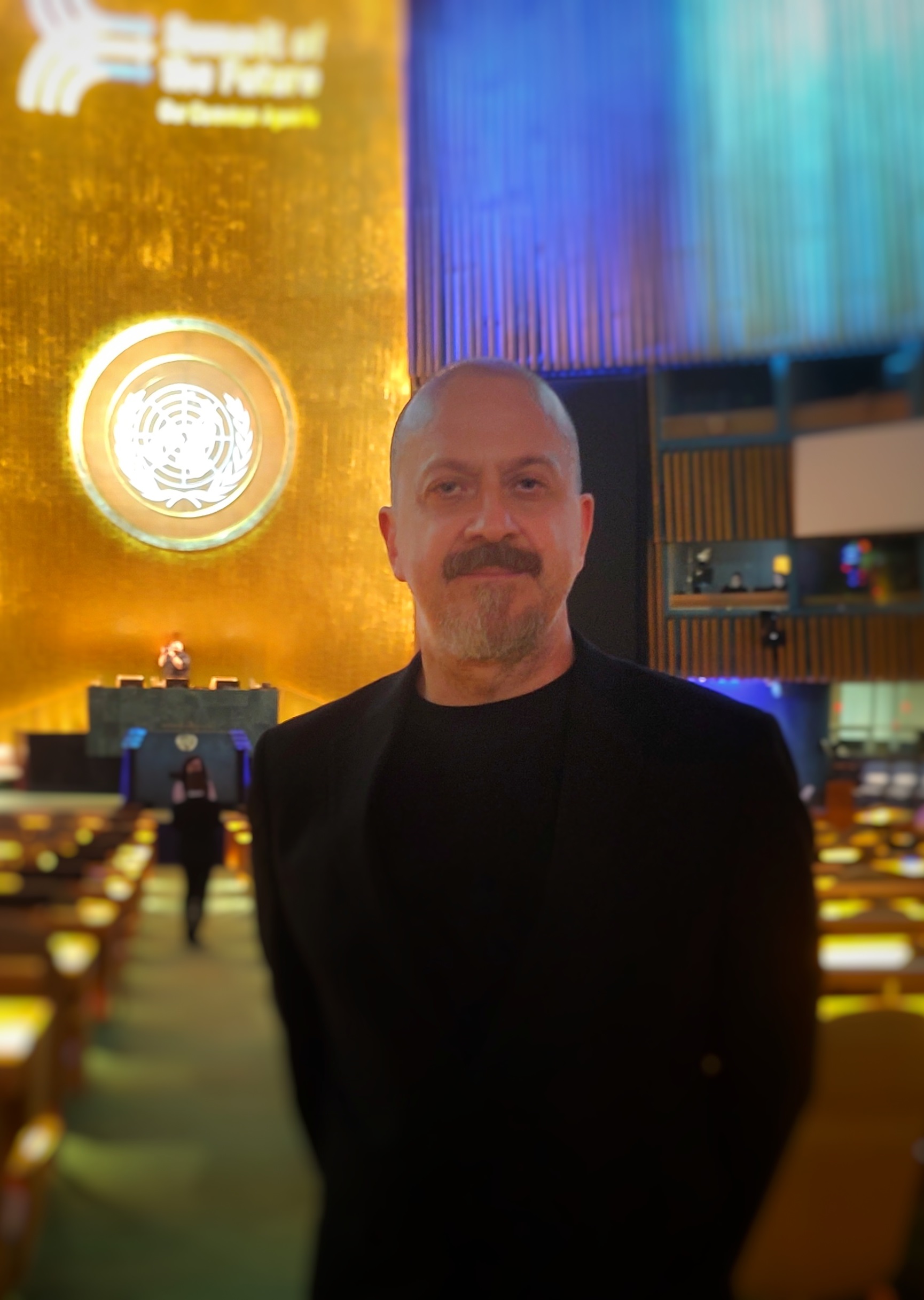Director Francesco Lapenta Speaks at Historic UN "Summit of the Future" in New York
Last week, Francesco Lapenta, Director of the Institute of Future and Innovation Studies, spoke at the ImPACT Coalition on AI & Cyber-Tech Governance session during the Action Days of the Summit of the Future at the United Nations in New York. The session, hosted at the UN Secretariat and moderated by Lawyers Hub and the Stimson Center, brought together global experts to discuss the “Governing AI for Humanity” document released by the UN as part of the “Pact for the Future.” It is a historical document that seeks to shape, among other key areas, the global governance of emerging technologies, especially artificial intelligence (AI).

The Pact is a significant step as it comes at a time of severe geopolitical confrontations and in a moment in which the global impact of AI is rapidly expanding, but the frameworks to govern it remain patchy and fragmented.
Lapenta’s presentation offered a critical perspective on the recently signed Pact, especially as it intersects with the broader challenges of AI and cyber-tech governance. His remarks underscored both the promise and the gaps within this historic agreement. AI governance, regulation, and the widening digital divide were central themes. He emphasized the urgency for stronger multilateral cooperation and more robust governance structures, noting that without them, AI’s benefits may remain unevenly distributed, especially leaving behind communities in the Global South.
The Pact: A Milestone for Urgent Global Cooperation on AI
The Pact for the Future marks a historical milestone for the UN, aiming to establish a vision for international cooperation in the face of rapidly evolving technologies. However, Lapenta argued that the document lacks the definitive language needed to ensure these goals are met. While it nods toward global cooperation, the voluntary nature of its commitments leaves room for disparities in AI governance across different regions. Lapenta pressed for more binding agreements, which would ensure that AI regulation benefits all, especially the underrepresented and marginalized communities.
Addressing the global digital divide, Lapenta pointed out that, despite AI’s potential to reduce inequality, the voices of nations from the Global South remain underrepresented in global decision-making processes. The Pact recognizes this imbalance but falls short of creating enforceable mechanisms to give these nations greater influence. This is a crucial shortcoming, as without inclusive governance, AI could exacerbate existing inequities, further entrenching the divide between those with access to technological advancements and those without.
Lapenta’s Concerns on the Pact’s Influence on Human Rights
Human rights also featured prominently in Lapenta’s critique. While the Pact references AI’s impact on privacy, discrimination, and civil liberties, it lacks the necessary enforcement mechanisms to hold violators accountable. Lapenta proposed the creation of a Special Rapporteur on AI and Human Rights, empowered to investigate and report on abuses, as a means to strengthen the accountability framework. This would be a crucial development given the growing concerns about AI’s role in surveillance and civil rights violations globally.
Lapenta also expressed reservations about centralizing AI governance within large, bureaucratic institutions like the UN Secretariat. He warned that such centralization could lead to a disconnect between policy-makers and the real-world impact of these technologies. Instead, he proposed a more decentralized, multi-stakeholder approach—mirroring the Internet Governance Forum’s dynamic coalitions—that could bring in voices from across sectors and regions, ensuring that AI governance remains flexible and inclusive.
The Momentum of AI on the Future: More Binding Regulations are Needed
Lapenta’s presentation arrives at a pivotal moment when international debates on AI governance are gaining momentum. “The Pact for the Future” represents a forward-looking initiative by the United Nations, but as Lapenta highlighted, it relies too heavily on voluntary frameworks, which could lead to inconsistent implementation and weaker governance in regions with less capacity to enforce regulations. Without legally binding commitments, the Pact risks being more symbolic than transformative, especially in ensuring equitable AI governance for vulnerable communities.
To address these concerns, Lapenta urged for capacity-building programs within UN agencies, especially those dealing with human rights and technology, to ensure they are equipped to handle the challenges that AI presents. He also called for strengthening legal frameworks, advocating for greater consistency in AI governance to protect the most vulnerable from exploitation and misuse.





